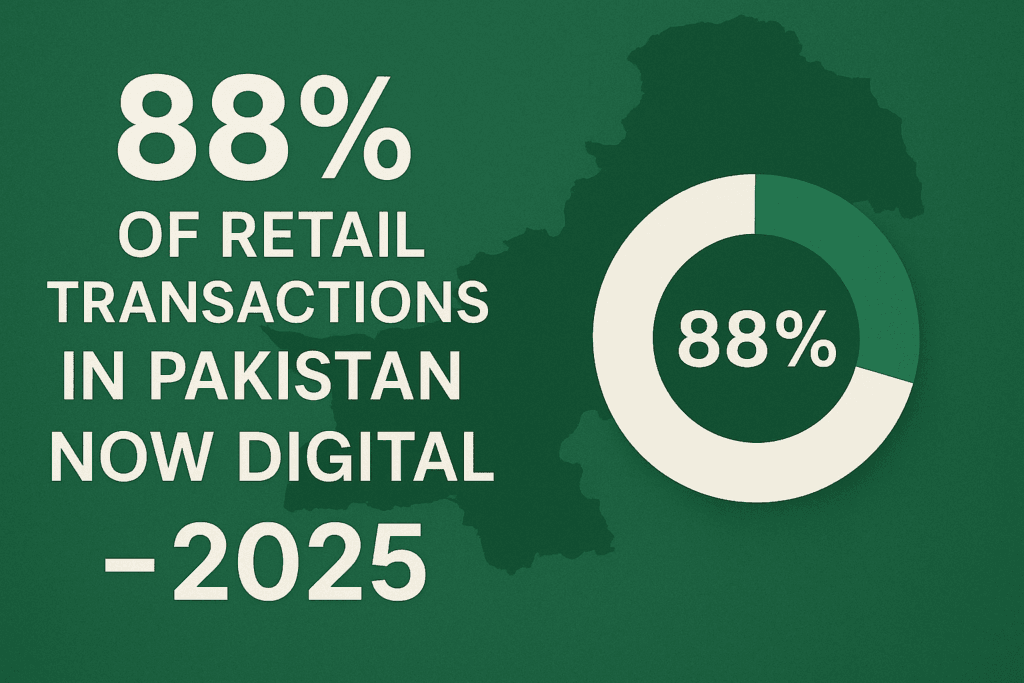
“Pakistan’s retail sector is going digital! In 2025, 88% of transactions are cashless. Learn what’s driving this shift and what it means for the future.”
Pakistan is undergoing a digital revolution in its retail sector! As of 2025, a staggering 88% of all retail transactions in the country are now processed digitally. This shift marks a major milestone in the adoption of cashless payments, reflecting the growing trust in online banking, mobile wallets, and fintech solutions. But what’s driving this rapid digital transformation? Let’s explore the key factors behind this shift, its benefits, and future implications for Pakistan’s economy.
The Rise of Digital Transactions in Pakistan
According to the State Bank of Pakistan (SBP), digital transactions have reached unprecedented levels. In the October to December 2024 quarter alone, 88% of all retail transactions were conducted digitally. This is an increase from 87% in the previous quarter, showcasing the accelerating momentum towards a cashless economy.
Pakistan’s digital payment ecosystem is evolving rapidly, fueled by several factors:
- Increased smartphone penetration – Over 190 million mobile connections enable more people to access digital payment platforms.
- Fintech innovation – Mobile wallets like Easypaisa, JazzCash, and SadaPay are making transactions seamless and secure.
- Government-led initiatives – Programs such as Raast, Pakistan’s instant payment system, are driving financial inclusion and reducing dependency on cash.
- Consumer shift to e-commerce – More retailers and small businesses are integrating digital payment solutions.
Why Pakistanis Are Going Digital
The transition to digital payments is not just a trend; it’s a necessity. Here’s why more people are ditching cash:
1. Convenience & Speed
- Digital payments allow users to send and receive money instantly without the hassle of cash handling.
- Online banking and mobile apps provide 24/7 accessibility, making transactions easier than ever.
2. Enhanced Security
- Digital transactions reduce risks associated with carrying cash, such as theft and fraud.
- Payment platforms now use two-factor authentication (2FA) and biometric verification, ensuring maximum security.
3. Financial Inclusion
- With over 120 million Pakistanis still unbanked, mobile wallets and digital banking are bringing financial services to remote areas.
- Women and rural populations are gaining more financial independence through accessible fintech solutions.
4. Government Support & Regulations
- The SBP and the Ministry of IT are actively promoting digital payments through policies that encourage businesses to go cashless.
- Tax incentives and subsidies for digital payment adoption are encouraging more merchants to make the shift.
Impact on Businesses & Economy
This surge in digital transactions is transforming Pakistan’s economy in multiple ways:
1. Boosting E-commerce & SMEs
- Online marketplaces like Daraz, Foodpanda, and Bykea are witnessing massive growth due to easy digital payments.
- Small businesses are benefiting from reduced cash handling costs and greater transaction transparency.
2. Increasing Tax Collection & Transparency
- Digital transactions leave an audit trail, helping the government curb tax evasion.
- The growing formal economy is attracting foreign investors and global tech companies.
3. Encouraging Financial Literacy
- Digital payment adoption is pushing people to learn more about budgeting, savings, and online banking tools.
Challenges & Future Outlook
Despite this progress, Pakistan faces challenges in its digital transformation:
- Internet accessibility issues in remote areas hinder widespread adoption.
- Cybersecurity threats require stronger data protection measures.
- Trust issues persist, especially among older generations used to cash transactions.
However, with continuous improvements in fintech innovation, government policies, and consumer awareness, Pakistan is on track to becoming a truly cashless economy in the coming years.
Conclusion
With 88% of retail transactions now digital, Pakistan is rapidly advancing towards a cashless future. The combined efforts of fintech startups, government initiatives, and changing consumer behaviors are driving this transformation. As digital payments become the norm, the economy is set to benefit from increased financial inclusion, transparency, and growth. Are you ready to embrace the digital revolution? Join the movement and experience the convenience of cashless transactions today!


Marvalest
Great thanks for the information